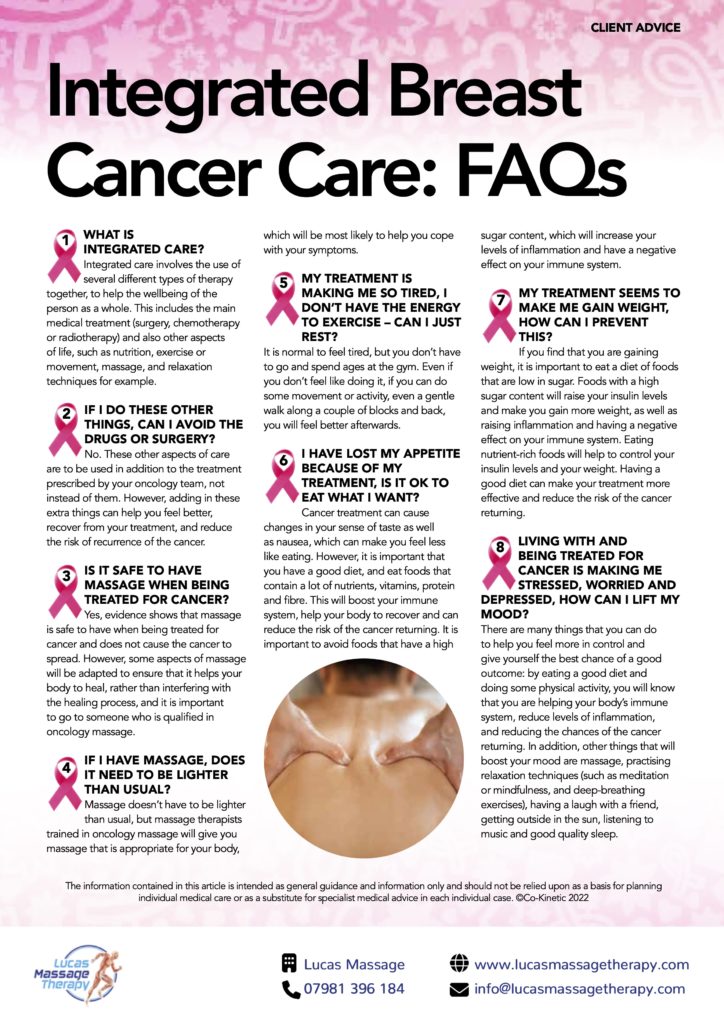Integrated Care During Breast Cancer Treatment
Breast cancer is the most prevalent type of cancer in the UK, affecting almost 60,000 women annually. The treatment approach for breast cancer depends on the stage of detection, tumour size, and the presence of metastasis. Typically, a treatment plan will involve a combination of surgery and chemotherapy, with continuous supervision from a healthcare professional. Upon receiving a breast cancer diagnosis, individuals may experience worry and uncertainty, often feeling a lack of control and seeking ways to regain some agency.
This leaflet provides suggestions to enhance recovery and prevent post-surgical recurrence in breast cancer patients. It is important to note that these recommendations are not a substitute for medical treatment, but rather a supplementary approach that considers the holistic well-being of the individual throughout and after treatment.
EXERCISE DURING BREAST CANCER TREATMENT
Maintaining a regular exercise routine is highly beneficial during breast cancer treatment. Studies have shown that it can decrease the risk of dying from breast cancer by up to 34% and lower the chances of recurrence by 20 to 40%. In fact, being inactive poses a greater threat to survival after a breast cancer diagnosis than being overweight. Beyond the statistics related to survival and recurrence, exercise offers numerous other advantages for those fighting breast cancer. It can help alleviate the side effects of treatments, such as osteoporosis, weight gain, and fatigue. Regular exercise also plays a crucial role in preserving muscle tone and minimizing post-treatment pain.
The positive impact of exercise on mental wellbeing cannot be underestimated. Engaging in physical activity triggers the release of endorphins and reduces cortisol levels, which is particularly beneficial for breast cancer patients. The recommended exercise levels for these patients align with those for the general population: 150 minutes of moderate exercise or 75 minutes of vigorous exercise per week. It is also important to incorporate strength training into your routine at least twice a week. If the thought of exercising seems daunting, there is no need to worry.
We understand that after undergoing treatment, fatigue may make it challenging to muster the energy for physical activity. However, even small amounts of exercise are better than none at all. Begin at your own pace and gradually increase intensity as you feel ready.
Walking is an excellent way to begin, particularly because it’s easy to find companions who can join you and provide motivation. For those who enjoy setting goals, walking offers a simple way to do so. Additionally, you may consider incorporating activities like housework, gardening, or even walking to the nearby store into your exercise routine.
Every little bit counts and can make a difference. In summary, although resting may seem like the best option during breast cancer treatment, it’s important to remember that exercise also offers significant benefits and contributes positively to your recovery. To learn more about the advantages of exercise and how to incorporate it into your treatment and recovery plan, please request our breast cancer information pack.

BREAST CANCER CARE – MASSAGE DURING BREAST CANCER
Massage therapy is often considered unsuitable for cancer patients due to concerns about the potential spread of the cancer. However, receiving a massage from a qualified therapist specializing in oncology massage allows you to enjoy the benefits without any adverse effects. In fact, incorporating massage therapy into your integrated care routine, alongside a healthy diet and regular exercise, can be highly beneficial. Massage helps enhance immune function by aiding lymphatic drainage and boosting the production of natural ‘killer cells’ that combat infections. Visit lucasmassagetherapy.com for more information on the history of massage.
Massage therapy can help manage and reduce the risk of lymphoedema after treatment. It provides various positive effects on your overall well-being, including relaxation, stress reduction, and improved mood. Studies have also found that massage significantly reduces nausea in chemotherapy patients. A skilled oncology massage therapist will prioritize your needs as a patient, tailoring the session to your specific situation and goals.
Whether you’re looking to regain movement and alleviate pain post-surgery, achieve a sense of acceptance, or simply promote well-being and relaxation, massage therapy can be a valuable tool in coping with the challenging experience of breast cancer treatment. To learn more about the benefits of massage for breast cancer patients, please request our breast cancer information pack.

BREAST CANCER NUTRITION
Individuals undergoing cancer treatment often inquire about the recommended diet. Undoubtedly, the food choices you make have a significant impact on your well-being and recovery. If your healthcare professional has provided specific dietary advice, it is crucial to adhere to it. In the absence of personalized guidance, below are some suggestions that may prove beneficial. Given the structured nature of treatment schedules, adhering to a strict diet can be challenging. Instead, you can opt for an ‘abundance model’ which entails consuming wholesome and nutritious foods without the need for calorie counting or portion control.
It is crucial to note that during challenging times, the inclination to turn to comfort foods should be avoided. Consuming excessive amounts of sugar, refined flour, and fast food can cause inflammation in the body and hinder recovery from treatment. It is especially important to control sugar intake as regulating insulin levels during cancer treatment can reduce recurrence rates by up to 50% and decrease mortality rates by two-thirds. So, what should you eat? Well, as you might have guessed, it is recommended to have a varied selection of fruits and vegetables daily, with a particular emphasis on dark, leafy greens for their beneficial effects on muscle and bone strength.
Foods containing anti-inflammatory properties like olive oil, tomatoes, garlic, as well as ginger and turmeric spices, are highly recommended. Additionally, incorporating foods rich in antioxidants such as blueberries, goji berries, green tea, and dark chocolate can aid the body in coping with treatment and combat fatigue. However, it is important to note that during chemotherapy, reduced appetite, nausea, and mouth sores are common side effects that may affect your desire to eat. If you are experiencing a decreased appetite, consuming small, frequent meals (around 6 a day) instead of three large meals can be beneficial.
Consuming smoothies is another effective method to acquire essential nutrients. If you encounter nausea as a result of chemotherapy, it is advisable to eat small, frequent meals. In such situations, it is beneficial to stay hydrated by consuming ample fluids and soothing herbal teas like ginger and peppermint to alleviate stomach discomfort. Additionally, if you develop mouth sores after treatment, employing a soft toothbrush, consuming soups and smoothies, and applying ice cubes to the affected area can provide relief.
Keep in mind that when undergoing chemotherapy, your immune system is often weakened, resulting in decreased levels of infection-fighting white blood cells. Due to this, it is crucial to prioritize the cleanliness of food preparation areas. If you want more information about suitable dietary choices and how different types of food can impact recovery during and after chemotherapy, please request our breast cancer information pack.

IN SUMMARY
Integrating care, with an emphasis on dietary and physical activities along with incorporating massage therapy, can have a substantial impact on your recuperation and emotional state while undergoing treatment for breast cancer. It is important to note that the suggestions provided in this leaflet are not intended to replace medical treatment. Nonetheless, taking charge of these aspects of your life and recovery can only bring about beneficial outcomes for your overall health and welfare.
Integrated Brest Cancer Care During Breast Cancer Treatment


